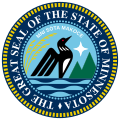Electoral system
Elections for state and federal offices were held via first-past-the-post voting, each producing a single winner. Nominations for parties with major party status, the Republican and DFL parties, were determined by an open primary election. The candidate that won the most votes in each party became their party's nominee in the general election. If only a single candidate sought the nomination for each party, those candidates were automatically nominated and a primary election for that office was not held. Candidates for major parties had automatic ballot access. Candidates for other parties and independents were nominated by petition.
Judicial and local elections were held via the nonpartisan blanket primary. The top-two candidates that won the most votes in the primary election advanced to the general election. If not more than two candidates sought election to the same office, a primary election was not held. In multiple-winner elections, the top number of candidates that won the most votes in the primary election that were twice the number of candidates to be elected advanced to the general election. If not more than twice the number of candidates to be elected sought election, a primary election was not held. Some cities, school districts, and all townships and hospital districts did not hold a primary election, regardless of the number of candidates. Judicial and local elections were nonpartisan.
The candidate filing period was from May 22 through June 5, 2018. The filing period for cities, townships, school districts, and hospital districts that do not hold a primary election was from July 31 through August 14, 2018. [2]
This page is based on this
Wikipedia article Text is available under the
CC BY-SA 4.0 license; additional terms may apply.
Images, videos and audio are available under their respective licenses.




